Capitol Hill Republicans are rapidly falling in line behind a bill that would force the disclosure of Justice Department files concerning Jeffrey Epstein after President Donald Trump signaled Monday he would sign it.
Two prominent House committee chairs said they planned to support the bill compelling the release of materials related to the late convicted sex offender, and GOP leaders are exploring whether to advance the measure under special fast-track rules later this week.
Meanwhile, Trump’s sudden support for the measure — after a monthslong campaign to kill it — has transformed its prospects in the Senate, where it was long assumed Republicans would simply bottle it up. Now a growing number of GOP senators are open to giving the bill a vote, and some are wondering whether it might simply be sent to Trump’s desk by unanimous consent.
It’s a remarkable reversal of fortune for the effort to disgorge the “Epstein files,” prompted by a successful bipartisan effort to circumvent Speaker Mike Johnson and force the legislation to the floor.
Recognizing that House approval of the legislation was all but certain, Trump abandoned his efforts to derail the bill in a social media post Sunday night. Asked in the Oval Office on Monday if he would sign it, Trump said, “Sure I would.”
Some of his closest allies in the House said Monday they were ready to follow the president’s lead.
House Judiciary Chair Jim Jordan (R-Ohio) said in an interview Monday afternoon he will vote for the Epstein bill.
“I think everyone will vote for it,” Jordan said, adding he agreed with Trump that Republicans need “to get this ridiculous thing past us.”
Asked if he expected any changes to the bill authored by Rep. Thomas Massie (R-Ky.) before it gets a floor vote, Jordan replied: “No.”
House Oversight Chair James Comer (R-Ky.), whose panel has released thousands of Epstein emails that have heightened scrutiny of Trump’s dealings with the disgraced financier, also said he would vote for the bill. He, too, suggested the vote would not be close.
“I mean, I think everybody’s gonna vote for it,” Comer said in an interview.
“It’s just a show vote, you know? I mean, we’re the ones that have already gotten all the new information from the estate,” he said, touting his own panel’s probe into the matter.
Comer also questioned the practical impact of the legislation: “I think the Department of Justice has turned over what they’re legally allowed to turn over.”
Trump suggested as much in his Sunday night post telling lawmakers to support the bill, with many Republicans skeptical about how much new information the department would release if the bill passes.
GOP leaders have tentatively planned to advance the Epstein bill by first adopting a procedural measure in the Rules Committee Monday night that would incorporate a separate procedural measure from Massie and Rep. Ro Khanna (D-Calif.). If adopted early Tuesday afternoon, the House would immediately proceed to debate and a final vote on the Epstein bill.
House Republican leaders also discussed the option Monday to put the bill up for a vote Tuesday or Wednesday under so-called suspension of the rules, a fast-track procedure requiring a two-thirds majority vote for passage. No final decision has been made, though, according to three people granted anonymity to describe private leadership deliberations.
Senate Majority Leader John Thune isn’t currently expected to weigh in on whether he will bring up the Epstein measure until after it passes the House, according to a person granted anonymity to disclose internal strategy.
But Trump’s support for passing the Epstein files resolution has changed the dynamic inside the Senate GOP, where top Republicans have previously downplayed the chances of the chamber acting on the House bill, according to two other people granted anonymity to comment on the sensitive matter.
A growing number of GOP senators are open to giving the resolution a vote — pointing to both Trump’s comments and interest from their own constituents in seeing Congress take action on Epstein.
“I don’t have any problems with data coming out. So lots of people ran on this issue in the last election, so I don’t have any problems with us voting on it,” Sen. John Boozman (R-Ark.) told reporters Monday.
Senate Republicans will not return to Washington until Tuesday evening, when they are expected to discuss next steps. The only way for the resolution to pass the Senate this week would be with buy-in from every senator to either speed up a vote or skip one altogether with a vote by unanimous consent, which would let it clear the chamber without a roll call vote.
Congressional passage — and a Trump signature — would not be the end of the Epstein saga on Capitol Hill, however.
Jordan said he plans to have Attorney General Pam Bondi back before his panel for a rescheduled oversight hearing “as soon as possible.” Questions about the Epstein case are sure to take center stage in any hearing, as they did when Bondi recently appeared before the Senate Judiciary Committee.
Lawmakers are also bracing for the possibility that Trump might pardon Epstein’s convicted accomplice Ghislaine Maxwell, a possibility Trump has repeatedly declined to rule out .
Comer responded sharply when asked if he’d support a pardon for Maxwell: “No, I do not,” he said. “I’ve already said that.”



